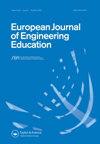影响信号和系统概念理解的教学因素
IF 2.8
Q2 EDUCATION & EDUCATIONAL RESEARCH
引用次数: 0
摘要
摘要:本文探讨了影响工科本科高年级学生对信号和系统概念理解的教学因素。先前的结果表明,信号和系统课程的学生通常获得很少的CU,尽管基于证据的教学实践,如主动学习,可以增加CU的收益。然而,很少有研究考虑到高年级学生的CU或其他增加CU的教学实践。为了探索可能的因素,我们采访了两位教师、八名大四本科生、五名研究生和四名执业工程师,然后使用恒定比较法对记录的访谈进行分析。参与者确定讲座在数学表达式旁边呈现CU;强调目的和联系的讲座;实践活动,学生可以控制,获得即时反馈,或者他们必须应用和综合概念;以及跨多个课程的概念重复作为帮助构建CU的因素。强调程序知识而非专业知识的成绩和繁重的工作负荷被认为是专业知识学习的障碍。本文将这些发现与概念理解理论和先前关于影响学生学习因素的研究结果联系起来。本文章由计算机程序翻译,如有差异,请以英文原文为准。
Instructional factors influencing conceptual understanding of signals and systems
ABSTRACT
This paper investigates what instructional factors influence conceptual understanding (CU) of signals and systems for senior undergraduate engineering students. Previous results show students in signals and systems courses typically gain little CU, though evidence-based instructional practices, such as active learning, can increase gains in CU. However, few studies consider CU of senior students or other instructional practices that increase CU. To explore possible factors, we interviewed two faculty members, eight undergraduate seniors, five graduate students, and four practicing engineers then analyzed the transcribed interviews using a constant comparative method. Participants identified lectures presenting CU along-side mathematical expressions; lectures emphasising purpose and connections; hands-on activities where students have control, receive immediate feedback, or where they have to apply and synthesise concepts; and repetition of concepts across multiple courses as factors that helped build CU. Grades that emphasise procedural knowledge over CU and heavy workloads were noted as hindrances to CU. This paper relates these findings to theories on conceptual understanding and previous results on factors that influence student learning.
求助全文
通过发布文献求助,成功后即可免费获取论文全文。
去求助
来源期刊

European Journal of Engineering Education
EDUCATION & EDUCATIONAL RESEARCH-
CiteScore
7.30
自引率
13.00%
发文量
64
期刊介绍:
European Journal of Engineering Education is published six times a year in print and electronic editions and provides an essential forum for dialogue between researchers and specialists in the field of engineering education, at European and worldwide levels. European Journal of Engineering Education is the Official Journal of SEFI, the Socièté Européenne pour la Formation des Ingénieurs (the European Society for Engineering Education). SEFI is a non-governmental organization whose aims are to develop information about engineering education, to improve communication and exchange between professors, researchers and students and to promote cooperation between the various institutions concerned with engineering education.
 求助内容:
求助内容: 应助结果提醒方式:
应助结果提醒方式:


